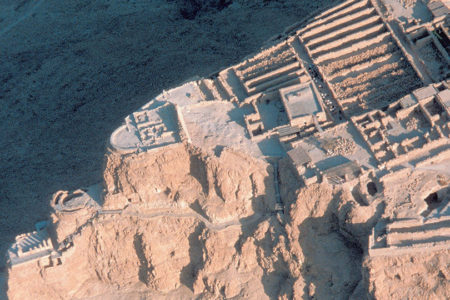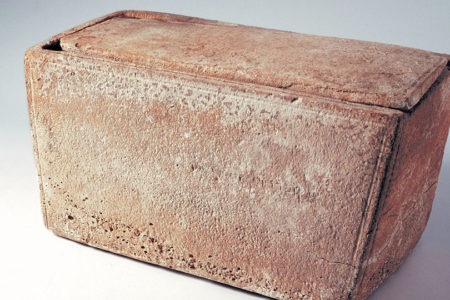Baruch Ha Shem
Blessed Be The Name
In Old Testament days the patriarchs and ancient Israelites were identified with names that had specific meanings. In Genesis 17:5, God changed the name of Abram (“exalted father”) to Abraham (“father of a multitude”). Genesis 17:15 records that God also changed Abraham’s wife’s name from Sarai(“my princess”) to Sarah (“princess”) because she would become a “mother of nations.”
These are but two examples of many where a name expressed a hope, wish, or prayer for the person named. Remember the birth of Hannah’s first child? First Samuel 1 records that God answered her prayer for a child with the birth of Samuel, a name that means “asked of the Lord.”
Nearly three thousand years have passed since then. Yet today Jewish tradition attaches the same importance to the naming of a child. The name selection process is different for Ashkenazi (European) and Sephardic (oriental) Jewish parents. Ashkenazi parents name their children after a special and significant deceased person. Sephardic parents do just the opposite, naming their children after significant living persons. Both groups hold a naming ceremony, where they publicly dedicate the child and the name.
Careful name selection is not exclusive to Jewish people. Christians also value names and their meanings. Many Christians name their children after individuals in the Bible, often hoping to teach the children to duplicate the qualities of their namesakes in their own lives.
In Scripture, God is known by many names. Three are considered primary: Elohim, Jehovah, and Adonai. In addition, He has many compound names that are revealed progressively throughout the Bible. Is the selection of these individual names for God important? The prophet Jeremiah recorded that the Lord Himself states, “I have sworn by my great name” (Jer. 44:26). David, the sweet psalmist of Israel, wrote Psalm 8 as praise to Yahweh: “O LORD, our Lord, how excellent is thy name in all the earth, who hast set thy glory above the heavens!” (v. 1). David also called on God’s name when he wrote Psalm 20:1: “The LORD hear thee in the day of trouble; the name of the God of Jacob defend thee.”
God’s name is excellent, and it protects us. God’s name implies the magnitude of all that He is, all His attributes. Not surprisingly, the New Testament is consistent with the Old Testament in its view of the importance of God’s name. John’s Gospel records, “But as many as received him, to them gave he power to become the children of God, even to them that believe on his name” (Jn. 1:12). Jesus said, “If ye shall ask anything in my name, I will do it” (Jn. 14:14). Jesus made it clear that believing in His name equaled believing in God.
Moses, under inspiration of the Holy Spirit, took little time to introduce us to the first name of God in the Torah (Pentateuch). Genesis 1:1 begins, “Berasheetbaraelohim,” “In the beginning God created.” Here the name used for God is the word Elohim. Of all God’s names, Elohim, used more than 2,500 times, is the most common one in the Old Testament. Using Elohimas the first name is most significant because it is a powerful name, a plural name, and a name used by two divine personalities.
A Powerful Name
Used thirty-two times in Genesis 1 alone, the name Elohim depicts the God of creation. The etymology of words and names can be difficult to prove. Yet there is reasonable, reliable evidence that the root of Elohimis El (Hebrew singular, “God”). Moses chose the word El in Numbers 23:22, proclaiming that El “brought them out of Egypt.” Used 250 times in the Old Testament, El is translated in English as “mighty, strong, and prominent.” Many individuals in the Bible incorporated the word El into their own names. Jacob’s name was changed to Israel, which means a “prince of God.” The young Jewish boy taken captive by Babylon was named Daniel, which means “my judge is God.” Elijah is translated “the Lord is God”; and Elisha, “my God is salvation.”
A word compounded with El is Alah, “which is said to mean to declare or swear. Thus it is said to imply a covenant relationship.”1 When placed together, El-Alah-im (Elohim) takes on the meaning of the strong, faithful one who keeps His covenant.
Elohim, the strong and powerful one, is a keeper of promises—the faithful one. Elohim called to Moses in a bush that was not consumed. In Exodus 3:6 God spoke to Moses saying, “I am the God [Elohim] of thy father, the God [Elohim] of Abraham, the God [Elohim] of Isaac, and the God [Elohim] of Jacob.”
Although the name Elohim conveys the power of the true God, it is not always used that way. Bible teacher John MacArthur wrote, “Elohim is a general term for deity and a name for the True God, though used also at times for pagan gods ([Gen.] 31:30), angels (Ps. 8:5), men (Ps. 82:6), and judges (Ex. 21:6).”2
It is, therefore, a name that should be interpreted in the context in which it appears:
“Thou shalt have no other gods [Elohim] before me” (Ex. 20:3).
“Ye shall not make with me gods [Elohim] of silver, neither shall ye make unto you gods [Elohim] of gold” (Ex. 20:23).
“For the LORD [Jehovah] your God [Elohim] is God [Elohim] of gods [Elohim], and Lord of lords, a great God [El], a mighty, and an awesome, who regardeth not persons, nor taketh reward” (Dt. 10:17).
A Plural Name
Thus Elohim can be used to designate false gods. The “im” ending makes it a plural word. Why is God, the one who created the heavens and the earth, the one who keeps His covenant, the one who chose the Jewish people, referred to by a plural name? The answer varies from source to source, which means it is important to examine the various answers.
Some use the argument that the plural word Elohim denotes a plural of majesty. Jewish scholarship is one such source. It has typically held that the plural is used to demonstrate “the plentitude of might.”3 The Zondervan Pictorial Bible Dictionary agrees:
Since the pl. [plural] word Elohim when used for God in the OT [Old Testament] is most emphatically sing. [singular] in meaning (Deut. 4:35, 39; 1 Ki. 8:60; 18:39; Isa 45:18, etc.), there is real probability that the Hebrews looked on it as a “plural of majesty.”4
The late evangelical, Hebrew-Christian scholar Dr. David L. Cooper, aware of this argument, wrote:
The writer [Cooper himself] is aware of the argument that the plural noun Elohim is the plural of “excellency majesty.” He admits, frankly, that in the Semitic world such usage was common when subjects addressed their king or at times spoke concerning him; but in the passages examined in this section, and in numerous other passages, there is nothing in the context of any of them which warrants a departure from the strict grammatical interpretation of the words and the substitution of an interpretation invented to support a theological bias.5
Others argue that the plural Elohim implies “plural of intensity.”6 This intensity infuses a sense of strength to the name, insuring a stronger meaning. Thus the God of creation is seen as stronger and more powerful when made plural: “With Elohim the plural form teaches us that no finite word can adequately convey the idea of the infinite personality or the unity of persons in the Godhead.”7
The key to understanding the plurality of Elohim does not seem to lie in some explanation but, rather, in simply allowing the name to stand the way it is, as a plurality of personhood. Like the patriarchs before us, we do not have to understand it completely. Dr. Michael Brown wrote:
The very concept of “compound unity” or “plurality in unity” was part of the language of the Tanakh. Such concepts would not be foreign to the biblical mind. So while these references to God or Lord in the plural do not in any way prove Trinitarian beliefs, they are certainly in perfect harmony with everything we are trying to say here, namely, that in some way the Lord’s unity is complex.8
A Name Applied to Two Personalities
Thy throne, O God [Elohim], is forever and ever; the scepter of thy kingdom is a right scepter. Thou lovest righteousness, and hatest wickedness; therefore God [Elohim], thy God [Elohim], hath anointed thee with the oil of gladness above thy fellows (Ps. 45:6–7).
Regarding Psalm 45:6–7, Arnold Fruchtenbaum stated in his book Messianic Christology,
It should be noted that the first Elohim is being addressed and the second Elohim is the God of the first Elohim. There are two quite distinct personalities here; it is Elohim’s Elohim who has set Elohim above His companions.9
This language is plain. The plural Elohimhas set the plural Elohimabove His companions. There is a unity to God.
William Shakespeare asked in Romeo and Juliet, “What’s in a name?” After the American Civil War, Confederate general Robert E. Lee was asked by an insurance company for permission to use his name for an endorsement. He reportedly said, “I have lost everything in the war except my name, and that is not for sale.”
The selection of a name, the meaning of a name, and the power of a name are all important. Elohim is the one true God whose personality is inherent in His plurality. And that fact should stimulate a thinking person to investigate all that this truth encompasses.
Most Jewish people hold God’s name in great reverence. In fact, many will not even speak it aloud. A number of years ago, my wife had the privilege of spending several days with an Orthodox Jewish woman. Her conversations were peppered with the phrase Baruch ha Shem— Blessed be the Name. It was never said lightly, but with great respect. “The Name” refers to one Person alone, to Him whose name many Jewish people consider too sacred to utter. May we be as respectful as we consider Elohim, Creator of the universe.
ENDNOTES
- Nathan Stone, Names of God (Chicago: Moody Press, 1944), 13.
- The MacArthur Study Bible (Nashville: Word, 1979), 16 n. 1:1—2:3.
- Arnold G. Fruchtenbaum, Messianic Christology (Tustin, Calif.: Ariel Ministries, 1998), 103.
- The Zondervan Pictorial Encyclopedia of the Bible, v. “elohim.”
- David L. Cooper, The God of Israel (Los Angeles:








Dr. Arnold Fruchtenbaum, probably the most solid Messianic Jewish Bible teacher on the planet says that in most cases when the plural Elohim is used the verb used is singular indicating that in most cases the Trinity is indeed in view and being taught. There is and can be no doubt that the concept of the triune nature of God as 3 persons is absolute truth. It astounds me that there are so many people who reject the concept. The Scriptures are clear that Jesus wasn’t praying to Himself but to God the Father. The Scriptures are also clear He relied on the ministry of God the Holy Spirit.